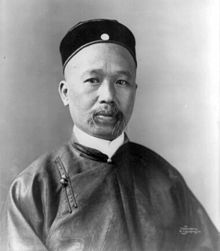Kang Youwei
| Kang Youwei | |
|---|---|
 |
|
| Born |
19 March 1858 Nanhai County, Guangdong, China |
| Died | 31 March 1927 (aged 69) Qingdao, Shandong, China |
| Other names | Kang Zuyi 康祖詒 Kang Guangxia 康廣廈 |
| Known for | Leader in the Gongche Shangshu movement Leader in the Hundred Days' Reform |
| Notable work | Reformation of Meiji Emperor (日本明治變政考), and Reformation of Peter the Great (俄大彼得變政記) |
| Spouse(s) | Zhang Yunzhu Liang Xujiao He Zhanli 4th wife Liao Dingzhen Zhang Guang |
| Children | 15 children, including Kang Tongbi |
| Relatives | (brother) |
| Kang Youwei | |||||||||||||||||
| Traditional Chinese | 康有為 | ||||||||||||||||
|---|---|---|---|---|---|---|---|---|---|---|---|---|---|---|---|---|---|
| Simplified Chinese | 康有为 | ||||||||||||||||
|
|||||||||||||||||
| Transcriptions | |
|---|---|
| Standard Mandarin | |
| Hanyu Pinyin | Kāng Yǒuwéi |
| Wade–Giles | K'ang1 Yu3-wei2 |
| IPA | [kʰáŋ jòu.wěi] |
| Yue: Cantonese | |
| Yale Romanization | Hōng Yáuh-wàih |
| Jyutping | Hong1 Jau5-wai4 |
| Kang Youwei | |
| Chinese name | |
|---|---|
| Traditional Chinese | 康有為 |
| Simplified Chinese | 康有为 |
| Hanyu Pinyin | Kāng Yǒuwéi |
| Wade–Giles | K'ang Yu-wei |
| Yale Romanization | Hōng Yáuh Wàih |
| Courtesy name (zi) | |
| Traditional Chinese | 廣廈 |
| Hanyu Pinyin | Guǎngsh๠|
| Yale Romanization | Gwóng-hah |
| Courtesy names (hao) | |
| Traditional Chinese | 長素 |
| Hanyu Pinyin | Chángsù |
| Yale Romanization | Chèuhng-sou |
| Chinese name | |
| Traditional Chinese | 明夷 |
| Hanyu Pinyin | Míngyí |
| Yale Romanization | Mìhng-yìh |
| Chinese name | |
| Traditional Chinese | 更生 or 更甡 |
| Hanyu Pinyin | Gēngshēng |
| Yale Romanization | Gāng-sāng |
| Chinese name | |
| Traditional Chinese | 西樵山人 |
| Hanyu Pinyin | Xīqiáo Shānrén |
| Yale Romanization | Sāi-chīu Sāan-yàhn |
| Chinese name | |
| Traditional Chinese | 游存叟 |
| Hanyu Pinyin | Yóucúnsǒu |
| Yale Romanization | Yàuh-chyùhn-sáu |
| Chinese name | |
| Traditional Chinese | 天游化人 |
| Hanyu Pinyin | Tiānyóu Huàrén |
| Yale Romanization | Tīn-yàuh Fa-yàhn |
| ¹ K'ang Yu-wei: A Biography and a Symposium gives Guǎngxià 廣夏 | |
Kang Youwei (Chinese: 康有為; Wade–Giles: K'ang Yu-wei; 19 March 1858 – 31 March 1927) was a Chinese scholar, noted calligrapher and prominent political thinker and reformer of the late Qing dynasty. He led movements to establish a constitutional monarchy and was an ardent Chinese nationalist and internationalist. His ideas inspired a reformation movement that was supported by the Guangxu Emperor but loathed by Empress Dowager Cixi. Although he continued to advocate a constitutional monarchy after the founding of the Republic, Kang's political theory was never put into practice.
Kang was born on 19 March 1858 in Nanhai County, Guangdong province (now the Nanhai District of Foshan City). According to his autobiography, his intellectual gifts were recognized as a child by his uncle. As a result, from an early age, he was sent by his family to study the Confucian classics to pass the Chinese civil service exams. However, as a teenager, he was dissatisfied with the scholastic system of his time, especially its emphasis on preparing for the eight-legged exams, which were artificial literary exercises required as part of the examinations.
Studying for exams was an extraordinarily rigorous activity so he engaged in Buddhist meditation as a form of relaxation, an unusual leisurely activity for a Chinese scholar of his time. It was during one of these meditations that he had a mystical vision that became the theme for his intellectual pursuits throughout his life. Believing that it was possible to read every book and "become a sage", he embarked on a quasi-messianic pursuit to save humanity.
...
Wikipedia
